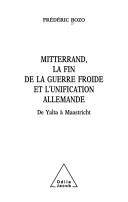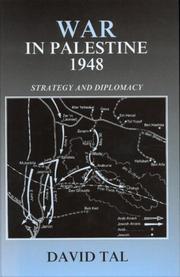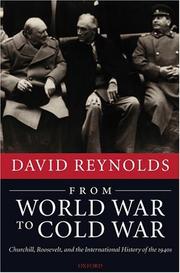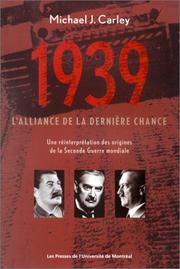| Listing 1 - 10 of 16 | << page >> |
Sort by
|
Book
ISBN: 2760337227 2760337197 2760337219 9782760337190 9782760337213 9782760337220 Year: 2022 Publisher: University of Ottawa Press
Abstract | Keywords | Export | Availability | Bookmark
 Loading...
Loading...Choose an application
- Reference Manager
- EndNote
- RefWorks (Direct export to RefWorks)
"Loin d'être limitée aux barbelés des camps ou aux frontières d'un seul pays, la détention des militaires allemands demeure un aspect méconnu dans le contexte particulier des relations triangulaires entre Ottawa, Washington et Londres. C'est dans cette optique que l'ouvrage Comment traiter les "soldats d'Hitler" ? explore la dynamique politique établie entre les autorités canadiennes, américaines et britanniques à l'égard du traitement des prisonniers de guerre allemands. Au cours de la Seconde Guerre mondiale, ces forces alliées détiennent quelque 600 000 "soldats d'Hitler" sur leur territoire respectif. Bien que gérées par chaque État, ces opérations d'incarcération soulèvent plusieurs enjeux associés à la coopération interalliée. Cette analyse détaillée compare le régime de captivité développé par chaque gouvernement selon ses prérogatives nationales et fait état d'importantes divergences entre les trois Alliés de l'Atlantique Nord dans la prise en charge de ces soldats ennemis. Jean-Michel Turcotte fait le bilan des politiques respectives et communes de ces autorités qui résultent de la participation à des projets conjoints, de rencontres périodiques visant à mieux coordonner leurs actions, de la consultation et de la correspondance les uns avec les autres, des échanges sur les problèmes liés à la détention de guerre et aux solutions apportées. Il présente également le positionnement des états concernant la Convention de Genève de 1929, la mise au travail des détenus et le programme de dénazification. Les conditions de la captivité des soldats allemands sont donc le résultat d'une influence mutuelle, entre les trois principales puissances détentrices sur le front Ouest, issue de l'expérience de chacun. Suivant cet argument, l'auteur met en lumière le rôle déterminant qu'occupe le Canada au sein des Alliés à cette époque."--
Book
ISBN: 0300240775 9780300240771 0300178832 9780300178838 Year: 2018 Publisher: New Haven, Connecticut
Abstract | Keywords | Export | Availability | Bookmark
 Loading...
Loading...Choose an application
- Reference Manager
- EndNote
- RefWorks (Direct export to RefWorks)
A fresh treatment of Fascist Italy and Nazi Germany, revealing the close ties between Mussolini and Hitler and their regimes†‹ From 1934 until 1944 Mussolini met Hitler numerous times, and the two developed a relationship that deeply affected both countries. While Germany is generally regarded as the senior power, Christian Goeschel demonstrates just how much history has underrepresented Mussolini's influence on his German ally. In this highly readable book, Goeschel, a scholar of twentieth-century Germany and Italy, revisits all of Mussolini and Hitler's key meetings and asks how these meetings constructed a powerful image of a strong Fascist-Nazi relationship that still resonates with the general public. His portrait of Mussolini draws on sources ranging beyond political history to reveal a leader who, at times, shaped Hitler's decisions and was not the gullible buffoon he's often portrayed as. The first comprehensive study of the Mussolini-Hitler relationship, this book is a must-read for scholars and anyone interested in the history of European fascism, World War II, or political leadership.
Fascism --- History --- Mussolini, Benito, --- Hitler, Adolf, --- Influence. --- World War, 1939-1945 --- Guerre mondiale (1939-1945) --- Relations extérieures --- Politique et gouvernement --- Fascisme --- Diplomatic history. --- Histoire diplomatique. --- Mussolini, Benito --- Hitler, Adolf --- Italy --- Germany --- Europe --- Foreign relations --- Politics and government
Book
ISSN: 13857827 ISBN: 9789004209916 9789004249066 9004209913 1299711561 9004249060 9781299711563 Year: 2013 Volume: v. 86 Publisher: Boston Brill
Abstract | Keywords | Export | Availability | Bookmark
 Loading...
Loading...Choose an application
- Reference Manager
- EndNote
- RefWorks (Direct export to RefWorks)
Traditionally isolated from mainstream European affairs, in 1914 the Dutch had no major allegiances that bound them to any one side of the conflict. Geographically and economically caught between two of the major belligerents, Great Britain and Germany, the Netherlands was constantly vulnerable to attack from either side. In adopting a position of neutrality at the beginning of the war, the Dutch took a huge gamble. The internment of approximately 50,000 foreign troops in the Netherlands, some for almost the entire four years of the war, provided an important showcase for the Dutch Government to demonstrate its adherence to international law and its impartiality towards the all of the belligerents.
History of the Netherlands --- anno 1910-1919 --- World War, 1914-1918 --- Neutrality --- Political refugees --- Prisoners of war --- Première guerre mondiale --- Neutralité --- Réfugiés politiques --- Prisonniers de guerre --- History --- Diplomatic history. --- Prisoners and prisons, Dutch --- Histoire --- Histoire diplomatique --- Prisonniers et prisons des néerlandais --- Première guerre mondiale --- Neutralité --- Réfugiés politiques --- Prisonniers et prisons des néerlandais --- Prisoners and prisons, Dutch.

ISBN: 2738116426 9782738116420 Year: 2005 Publisher: Paris: Odile Jacob,
Abstract | Keywords | Export | Availability | Bookmark
 Loading...
Loading...Choose an application
- Reference Manager
- EndNote
- RefWorks (Direct export to RefWorks)
Cold War --- Guerre froide --- Diplomatic history. --- Histoire diplomatique --- Mitterrand, François, --- Influence. --- France --- Europe --- Foreign relations --- Relations extérieures --- Diplomatic history --- Influence --- Mitterrand, François, --- Relations extérieures --- Cold War - Diplomatic history --- Mitterrand, François, - 1916-1996 - Influence --- France - Foreign relations - 1981-1995 --- France - Foreign relations - Europe --- Europe - Foreign relations - France --- Mitterrand, François, - 1916-1996

ISBN: 071465275X 1280049502 0203499549 1135775133 9780203499542 9780714652757 9786610049509 6610049505 9781135775087 9781135775124 9781135775131 9780415761376 1135775125 Year: 2003 Publisher: Portland, OR Frank Cass
Abstract | Keywords | Export | Availability | Bookmark
 Loading...
Loading...Choose an application
- Reference Manager
- EndNote
- RefWorks (Direct export to RefWorks)
Israel-Arab War, 1948-1949. --- Israel-Arab War, 1948-1949 --- Conflit israélo-arabe, 1948-1949 --- Conflit israelo-arabe, 1948-1949 --- Armistices. --- Diplomatic history. --- Armistices --- Histoire diplomatique --- Conflit israélo-arabe, 1948-1949 --- Arab-Israel War, 1948-1949 --- Jewish-Arab War, 1948-1949 --- Palestine War, 1948-1949 --- Arab-Israeli conflict
Book
ISBN: 9781782387053 9781782387060 9781785337376 1782387064 1782387056 1785337378 Year: 2015 Publisher: New York : Berghahn Books,
Abstract | Keywords | Export | Availability | Bookmark
 Loading...
Loading...Choose an application
- Reference Manager
- EndNote
- RefWorks (Direct export to RefWorks)
"This volume looks into the relationship that East Germany held with non-white socialistic nations, such as China and Cuba, as well as socialistic and communistic minorities in the United States. The volume also relates how these states and individuals saw East Germany"--Provided by publisher.
African American communists --- Socialism --- International relations --- Cold War --- Communistes noirs américains --- Socialisme --- Relations internationales --- Guerre froide --- History --- Diplomatic history. --- Histoire --- Histoire diplomatique --- Germany (East) --- Asia --- Cuba --- Allemagne (Est) --- Asie --- Relations. --- Race relations --- Political aspects --- Relations --- Relations raciales --- Aspect politique --- Relations extérieures --- Histoire. --- Political aspects. --- Relations extérieures
Book
ISBN: 9004288244 9789004288249 9789004288232 9004288236 Year: 2015 Publisher: Leiden Boston
Abstract | Keywords | Export | Availability | Bookmark
 Loading...
Loading...Choose an application
- Reference Manager
- EndNote
- RefWorks (Direct export to RefWorks)
At the President’s Pleasure offers a new perspective on the way the United States and China interacted during World War II. Sally K. Burt examines President Franklin Roosevelt’s methods of conducting diplomacy, particularly his tendency to centralise foreign policy-making into his own hands, as it applied to wartime Sino-US relations. By critiquing the president’s foreign policy leadership with China, Burt provides a new perspective on US diplomacy and opens the door for further exploration of contemporary methods of conducting relations between the US and China. This book, then, will interest scholars, historians, international relations specialists and practitioners and those interested in global politics, both historical and in the present day.
World War, 1939-1945 --- Diplomatic history. --- Historiography --- Roosevelt, Franklin D. --- Ruzvelʹt, Franklin, --- Rūzvilt, Franklin Dilānū, --- Rūzfilt, Franklin Dilānū, --- Lo-ssu-fu, --- Luosifu, --- F. D. R. --- R., F. D. --- FDR --- רוזוועלט, פראנקלין ד. --- רוזוועלט, --- Roosevelt, F. --- Roosevelt, F. D. --- Influence. --- United States --- China --- Foreign relations --- 2ème guerre mondiale --- Histoire diplomatique --- Etats-Unis --- Chine --- Relations extérieures

ISBN: 128087001X 0191536326 1429492988 9780191536328 9781280870019 9786610870011 6610870012 0199284113 9780199284115 9781429492980 0191608661 9780199237616 1383042977 9780191608667 Year: 2006 Publisher: Oxford New York Oxford University Press
Abstract | Keywords | Export | Availability | Bookmark
 Loading...
Loading...Choose an application
- Reference Manager
- EndNote
- RefWorks (Direct export to RefWorks)
The 1940s was probably the most dramatic and decisive decade of the 20th century. In this collection of incisive essays, Reynolds explores some of the major themes, events and personalities of this pivotal decade.
World politics. --- World War, 1939-1945. --- World War, 1939-1945 --- World politics --- History & Archaeology --- History - General --- Diplomatic history --- Diplomatic history. --- Great Britain --- United States --- Foreign relations --- Historiography --- 1945-1955 --- 1933-1945 --- 1945-1953 --- 1936-1945 --- 1945-1964 --- Churchill, Winston (1874-1965) --- Roosevelt, Franklin Delano (1882-1945) --- Guerre mondiale (1939-1945) --- Relations internationales --- Guerre froide --- Grande-Bretagne --- États-Unis --- Et la Grande-Bretagne --- Et les États-Unis --- 1939-1945 --- Et l'Allemagne --- Et l'Italie --- Histoire diplomatique --- Relations extérieures
Book
ISBN: 2020124130 9782020124133 Year: 1990 Volume: H138 Publisher: Paris: Seuil,
Abstract | Keywords | Export | Availability | Bookmark
 Loading...
Loading...Choose an application
- Reference Manager
- EndNote
- RefWorks (Direct export to RefWorks)
France --- Politics and government --- Foreign relations --- Politique et gouvernement --- Relations extérieures --- -Foreign relations --- -Politics and government --- -France --- Relations extérieures --- Pʻŭrangsŭ --- Frankrig --- Francja --- Frant︠s︡ii︠a︡ --- Prantsusmaa --- Francia (Republic) --- Tsarfat --- Tsorfat --- Franḳraykh --- Frankreich --- Fa-kuo --- Faguo --- Франция --- French Republic --- République française --- Peurancih --- Frankryk --- Franse Republiek --- Francland --- Frencisc Cynewīse --- فرنسا --- Faransā --- Franza --- Republica Franzesa --- Gallia (Republic) --- Hyãsia --- Phransiya --- Fransa --- Fransa Respublikası --- Franse --- Францыя --- Frantsyi︠a︡ --- Французская Рэспубліка --- Frantsuzskai︠a︡ Rėspublika --- Parancis --- Pransya --- Franis --- Francuska --- Republika Francuska --- Bro-C'hall --- Френска република --- Frenska republika --- França --- República Francesa --- Pransiya --- Republikang Pranses --- Γαλλία --- Gallia --- Γαλλική Δημοκρατία --- Gallikē Dēmokratia --- فرانسه --- Farānsah --- צרפת --- רפובליקה הצרפתית --- Republiḳah ha-Tsarfatit --- פראנקרייך --- 法国 --- 法蘭西共和國 --- Falanxi Gongheguo --- フランス --- Furansu --- フランス共和国 --- Furansu Kyōwakoku --- Francija --- Ranska --- Frankrike --- -Guerre mondiale (1939-1945) --- Histoire diplomatique. --- Guerre mondiale (1939-1945) --- Histoire diplomatique --- France - Politics and government - 1940-1945 --- France - Foreign relations - 1914-1940 --- France - Foreign relations - 1940-1945 --- France - Politics and government - 1914-1940

ISBN: 9791036504259 2760623513 2760617637 2760628892 9782760628892 9782760623514 Year: 2001 Publisher: Presses de l’Université de Montréal
Abstract | Keywords | Export | Availability | Bookmark
 Loading...
Loading...Choose an application
- Reference Manager
- EndNote
- RefWorks (Direct export to RefWorks)
Au moment où l'Allemagne nazie prépare la guerre, les négociations entre la France, la Grande-Bretagne et l'URSS constituent la dernière chance de stopper l'agression hitlérienne. Pourtant, les gouvernements français et britannique se traînent les pieds. Finalement, les pourparlers entre les trois pays échouent et en août 1939, l'URSS signe un pacte de non-agression avec l'Allemagne. Le récit poignant que fait Michael Carley de ces négociations souvent secrètes n'est pas une belle histoire. La narration fascinante d'un jeu diplomatique très complexe, mettant en scène des personnalités souvent troublantes, repose sur des recherches de longue haleine menées par l'auteur dans les archives françaises, britanniques et soviétiques, accessibles au public depuis peu. En faisant de 1939 un moment fort de la guerre froide déjà amorcée après la Révolution bolchevique de 1917 et en montrant comment l'anticommunisme fut la cause majeure de l'échec de l'alliance contre Hitler, Michael Carley remet en cause les interprétations généralement admises sur les origines de la Seconde Guerre mondiale.
World War --- World War, --- Diplomatic history. --- Causes. --- France --- Grande-Bretagne --- U.R.S.S. --- Great Britain --- Soviet Union --- Relations extérieures --- Foreign relations --- Guerre mondiale, 1939-1945 --- World War, 1939-1945 --- Histoire diplomatique. --- External relations --- National socialism --- Historiography --- Pʻŭrangsŭ --- Frankrig --- Francja --- Frant︠s︡ii︠a︡ --- Prantsusmaa --- Francia (Republic) --- Tsarfat --- Tsorfat --- Franḳraykh --- Frankreich --- Fa-kuo --- Faguo --- Франция --- French Republic --- République française --- Peurancih --- Frankryk --- Franse Republiek --- Francland --- Frencisc Cynewīse --- فرنسا --- Faransā --- Franza --- Republica Franzesa --- Gallia (Republic) --- Hyãsia --- Phransiya --- Fransa --- Fransa Respublikası --- Franse --- Францыя --- Frantsyi︠a︡ --- Французская Рэспубліка --- Frantsuzskai︠a︡ Rėspublika --- Parancis --- Pransya --- Franis --- Francuska --- Republika Francuska --- Bro-C'hall --- Френска република --- Frenska republika --- França --- República Francesa --- Pransiya --- Republikang Pranses --- Γαλλία --- Gallia --- Γαλλική Δημοκρατία --- Gallikē Dēmokratia --- فرانسه --- Farānsah --- צרפת --- רפובליקה הצרפתית --- Republiḳah ha-Tsarfatit --- פראנקרייך --- 法国 --- 法蘭西共和國 --- Falanxi Gongheguo --- フランス --- Furansu --- フランス共和国 --- Furansu Kyōwakoku --- Francija --- Ranska --- Frankrike --- France (Provisional government, 1944-1946) --- 프랑스 --- Falanxi --- Fa-lan-hsi --- 法蘭西 --- Frankrijk --- Frant︠s︡ --- Франц --- Frant︠s︡ Uls --- Франц Улс --- relations internationales --- guerre mondiale --- histoire diplomatique
| Listing 1 - 10 of 16 | << page >> |
Sort by
|

 Search
Search Feedback
Feedback About UniCat
About UniCat  Help
Help News
News